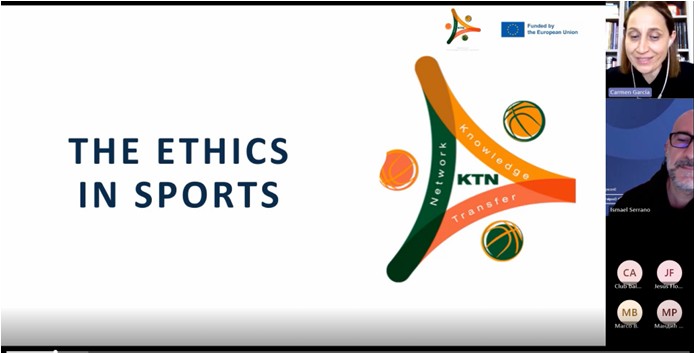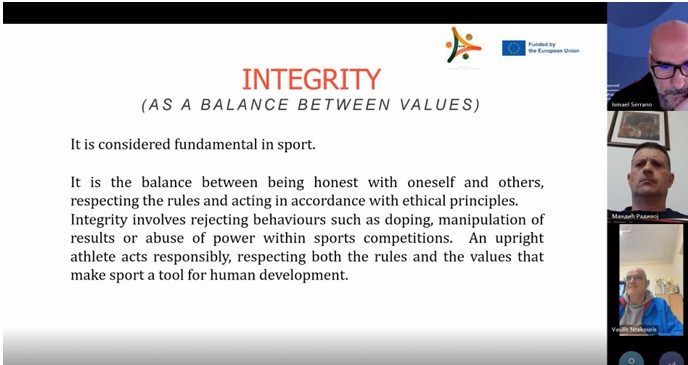Integrity and Values in sports
On April 9, 2025, the Federación Baloncesto de Castilla-La Mancha, within the framework of the Basketball-KTN project, organized an educational webinar dedicated to one of the most timeless and essential topics in sport: integrity and values. In a world where sports have become a global spectacle and a multimillion-dollar industry, the session served as a strong reminder that true greatness in sport is not only about winning but about how victory is achieved—with honesty, fairness, and respect.
The discussion opened with a reflection on the very meaning of ethics in sports. Derived from the Greek word ethos, meaning “character” or “habit”, ethics goes beyond rules and regulations; it defines the moral compass that guides behavior, attitude, and decision-making for everyone involved—athletes, coaches, referees, and organizations. True success, as highlighted during the session, is measured not only by victories but by the way those victories are pursued—through respect, discipline, and sportsmanship. Inspired by Aristotle’s concept of areté, or excellence through virtue, the speakers emphasized that athletes are called not only to perform but to embody values that elevate the human spirit.
Participants were introduced to international standards and frameworks that promote ethics and inclusion in sport, such as the Kazan Action Plan, which aligns sports policy with the United Nations Sustainable Development Goals. Through initiatives of the International Olympic Committee (IOC), the World Anti-Doping Agency (WADA), and UNESCO, ethics has been established as a pillar of global sport governance, promoting transparency, fair play, and equal opportunities.
The presentation underlined that sports ethics is based on two complementary value systems: instrumental values—how athletes behave, showing respect, discipline, and teamwork—and terminal values, which refer to what they seek to achieve, such as excellence, self-fulfillment, and personal growth. Integrity was presented as the core value linking both, ensuring that actions reflect beliefs. Fair play, it was noted, is more than a set of rules; it is a culture of dignity, empathy, and mutual respect that should guide every interaction in sport.
The critical role of the coach was also explored. Beyond being a technical instructor, the coach acts as a moral educator who helps young athletes understand success not as victory at any cost, but as winning ethically. By modeling honesty, perseverance, and solidarity, coaches become the everyday transmitters of ethical behavior and sportsmanship.
A distinction was also made between ethics and morality. While morality often reflects local customs and traditions, ethics represents universal principles that transcend borders and cultures, ensuring fairness and justice for all participants regardless of background. This universality allows sport to serve as a common ground for values that unite rather than divide.
Modern sport, however, faces serious ethical challenges that threaten its integrity. Issues such as violence and aggression on the field, discrimination based on gender, race, or ability, over-commercialization, and the use of performance-enhancing substances were presented as major concerns. Addressing these challenges requires awareness, critical thinking, and moral leadership at every level—from individual athletes to governing bodies.
The webinar also explored the social responsibility of sport and its power to drive positive change. Global initiatives such as NBA Cares, the FIFA Foundation, and Laureus Sport for Good were cited as examples of how sport can promote education, equality, and community development. Ethical sports organizations, participants agreed, must aim not only for profit or competitive success but also for justice, inclusion, and human development.
Particular emphasis was placed on the educational power of youth sport. Coaches and educators have a unique opportunity to shape future generations by using methods such as project-based learning, cooperative training, and critical reflection. These approaches help young athletes internalize values that extend far beyond the playing field—values that last throughout life.
The webinar concluded with a unifying message: sport is not only a competition but a reflection of who we are and what we believe in. When practiced with integrity, it cultivates respect, empathy, and solidarity, creating better athletes and better people. Through initiatives like this, the Federación Baloncesto de Castilla-La Mancha and the Basketball-KTN network reaffirm their commitment to promoting a vision of sport rooted in ethics, humanity, and purpose—proving that true excellence lies not in the trophies we win, but in the values we uphold.

